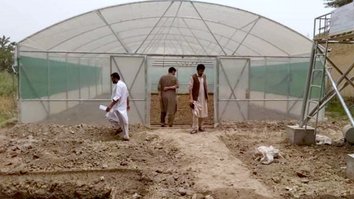KUNDUZ -- Women in Balkh province are benefitting from a project to help make them self-sufficient.
Shekeba, 48, a single mother of five, lives in Hayatabad village, Nahr-e-Shahi district.
"I lost my husband in November 2019 in a bomb blast in Mazar-e-Sharif," she said on May 30. "Since then, I haven't seen a good day."
"I faced a lot of problems after I lost my husband," Shekeba said. "From laundry to cooking to house cleaning, I did everything to make a living for my children."
![One of 15 greenhouses built by ACTED in Balkh province in March to empower women and help them make an income. [ACTED Afghanistan]](/cnmi_st/images/2022/06/07/35675-greenhouse-585_329.jpg)
One of 15 greenhouses built by ACTED in Balkh province in March to empower women and help them make an income. [ACTED Afghanistan]
Now, however, she is part of a greenhouse project implemented by the Agency for Technical Co-operation and Development (ACTED), a French humanitarian NGO.
"Now, I am a little hopeful that by growing and selling vegetables, I will be able to make a living on my own."
ACTED, with funding from the French Foreign Ministry, built 15 greenhouses in Nahr-e-Shahi, Dehdadi and Charkent districts, according to Hasratullah Hamidi, ACTED's regional manager in Mazar-e-Sharif.
The greenhouses come with the necessary tools and vegetable seedlings for women to grow crops and support their families, he said.
"Each greenhouse is 120 sq. metres: 15 metres long and eight metres wide," said Hamidi.
"Twenty women work in each greenhouse, growing a variety of vegetables," he added. "These women have already been trained in cultivating and harvesting techniques."
The project was launched in March to help women become self-sufficient, according to Hamidi.
Each greenhouse cost 350,000 AFN ($3,900), he added.
"I am a housewife and mother of three. My husband is paralysed, and I am the breadwinner of my family," said Zulaikha Rashidi, another beneficiary of the project in Nahr-e-Shahi district.
"We are a team of 20, and we have grown cucumbers, tomatoes, eggplants, peppers, lettuce, radishes and other seasonal vegetables in our greenhouse," she said. "We will pick the first yields in a few days."
"I am very happy now that I am busy doing something as well as I can address some of my family's daily needs," she said.
Rashidi, a high school graduate, said that she is now also busy helping other women take care of their greenhouses.
The same project is also being implemented in Jawzjan, Takhar, Baghlan and Badghis provinces, according to ACTED Afghanistan.
Preventing domestic violence
While the objective of the project is to empower and improve the self-reliance of impoverished and widowed women, such programmes also have helped women escape domestic violence.
"We are happy for the opportunity we have got. Through this, we can support ourselves and our families," Khadija Alami, a 38-year-old resident of Dehdadi district, told Salaam Times.
"In most cases, domestic violence is caused by unemployment," Alami said, adding that additional income can alleviate family issues.
The imposition of restrictions and present-day pressure on women make them further isolated, depressed and subject to domestic violence, said Farida Bekzada, a resident of Kunduz city.
"Experience has shown that most domestic violence against women and depression happen inside the house," she said.
"When women work outside their homes, they are protected from domestic violence and can economically support their men too."
"Women should be given work and employment opportunities so that they grow and become empowered," Bekzada said.

![A woman harvests crops at her new greenhouse in Nahr-e-Shahi district, Balkh province, on June 22, 2020. [Balkh Department of Agriculture, Irrigation and Livestock]](/cnmi_st/images/2022/06/07/35674-af-women-greenhouse-585_329.jpg)







May such news be more. What Ms. Shakiba has said is true. We see with our own eyes how much trouble people are facing. So instead of thinking that the words of Shakiba and hundreds of thousands of other women are now 100% true, they are in trouble because of economic problems. Indeed, many women wash other people's clothes, cook for them, clean their houses, take their children to play, to earn halal alimony for their children. Still, even working in a foreign home, they can face many difficulties and challenges. In my opinion, doing such things on one's own is the work of others. You also mentioned in your report that such programs could help reduce the risk of domestic violence. That's right. Recently, domestic violence in Afghanistan has risen to an all-time high due to unprecedented economic problems.
Reply4 Comment
I enjoyed reading this news. Greenhouses help people grow their economies and agricultural products and can also be an excellent alternative to global warming. People can also get a variety of vegetables in seasons other than their season, improving their health as they can get the required vitamins and other essential nutrients in all seasons. Thanks to Salam Times for keeping our hopes alive by publishing such news.
Reply4 Comment
Creating job opportunities and women empowerment is a good job and I thank ACTED agency and the donors for providing women the opportunity to stand by their own feet and be financially self-sufficient. The point which attracted my attention in this report is that the creation of these job opportunities has also resulted in the prevention of domestic violence. I myself have witnessed many times that the unemployed men who spend all their time at home oppress their wives and beat them with small excuses. I have also seen those women who have jobs get more respect and prestige at home than men, because they work, earn money and support their families. Therefore this is a very good and important action and it is necessary to increase the number of these Greenhouses and bring more people and areas under its coverage. With thanks. Shereen Alizai
Reply4 Comment
Good news :) Thanks to Salaam Times for publishing such useful news.
Reply4 Comment